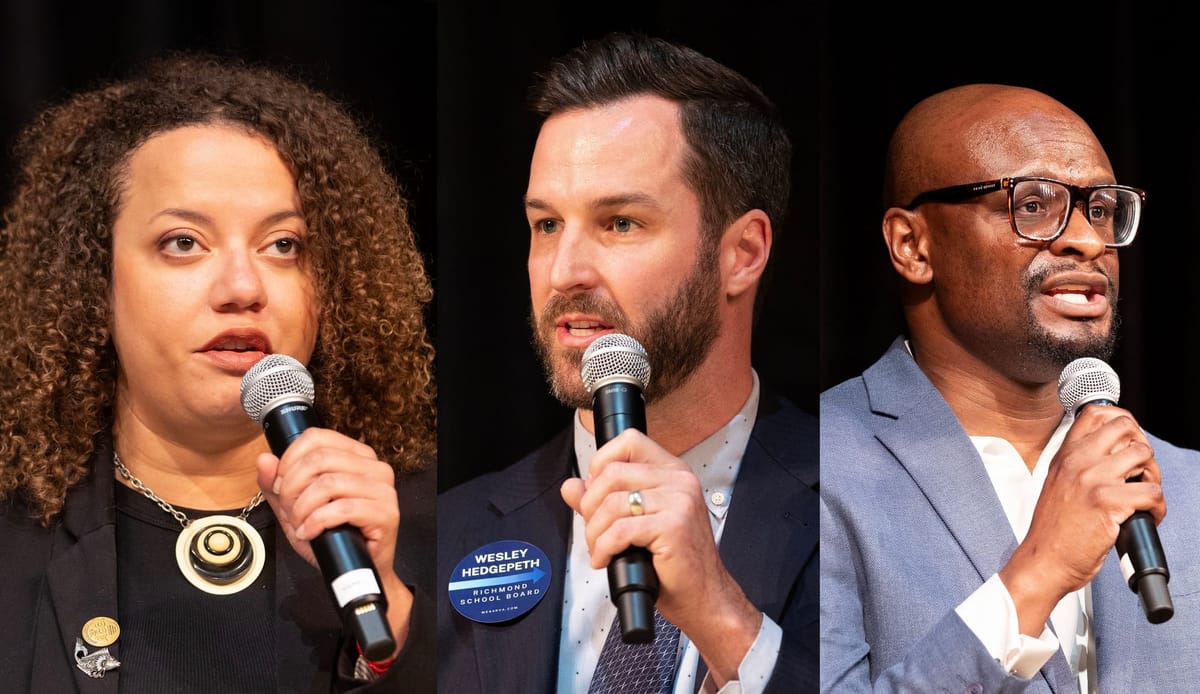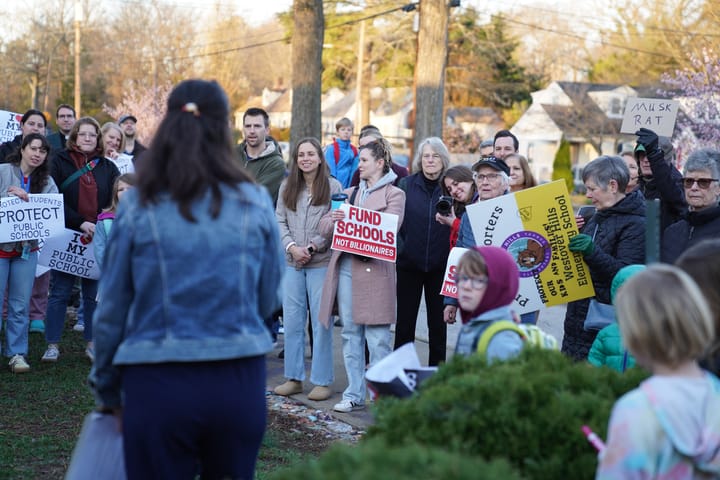Highly competitive 4th District School Board race sees candidates agree on need for better governance

Richmond’s 4th District is shaping up to be one of the most hotly contested School Board seats this November, with three candidates competing for votes.
Garrett Sawyer, a human resources consultant who has been closely involved with local Democratic and civic organizations, has been representing the 4th District since May, when he was appointed by the School Board to fill the position previously held by Jonathan Young.
This year’s race is Sawyer’s second full bid for local office after losing a 2016 City Council race to represent the city’s 5th District to Parker Agelasto. Earlier this year, he filed paperwork to run for mayor and then dropped that bid to run for the 4th District City Council seat before pivoting to the School Board in April.
“I’m uniquely positioned to advocate and fight for what is needed in our schools on day one,” he said. “Since I’ve been appointed, things that people were asking for within the schools in the 4th District for years have already been taken care of.” He points in particular to the drawing of lines on the soccer fields and renovations of an old concession stand at Southampton Elementary, as well as the School Board’s recent move to transfer the fields behind Westover Hills Elementary to the city for major upgrades.
Despite his brief incumbency, Sawyer will face a stiff challenge from opponents Wesley Hedgepeth and Angela Fontaine, both of whom also sought the 4th District School Board appointment earlier this year.
Hedgepeth, a Collegiate School social studies teacher who grew up in Hopewell, is also president of the National Council for the Social Studies and former president of the Virginia Council for the Social Studies. During his leadership, NCSS was heavily involved in pushback against new history and social studies standards rolled out by Gov. Glenn Youngkin’s administration that Hedgepeth said sought to “whitewash” what the state teaches students.
“Every perspective is very valuable, and I’m the only educator, current K-12 educator, who’s running for the School Board in the 4th District,” he said during a League of Women Voters forum this September. “That’s a voice that’s terribly missing from the board. I’ve taught over 1,000 students in my career thus far. I know what it takes for them to succeed and I’m committed deeply to their success.”
Fontaine, a change management coach and consultant who previously co-chaired the task force that led to the creation of Richmond’s Civilian Review Board, is pointing to both her experience with strategic planning and her role as a parent as selling points for voters.
“I believe that I'm able to be strategic in a way that really is able to lean into the vision of the School Board and remove my ego from the conversation, and just to make sure those things get done. This is what I help many nonprofit and government agencies do,” she said. “Also the fact that I'm a parent of RPS students, I have a perspective that the other two candidates do not have.”
Fundraising reports from the Virginia Public Access Project show Sawyer with the most cash on hand: over $55,000, of which $45,000 is a loan he made to himself. In the most recent reporting period, his biggest dollars — more than $1,600 — came from Richmond for All, a political organization co-founded by outgoing School Board member Kenya Gibson.
Hedgepeth has reported raising almost $19,000, and Fontaine about $2,200.
On the endorsement front, Sawyer is also being backed by the Richmond Crusade for Voters, Richmonders for Effective Governance of Schools, Richmond for All and the PAC for the Richmond Education Association, the teachers union.
Richmond for All has touted Sawyer as having “consistently opposed the expansion of charter schools in the district.” At the September forum, all three candidates including Sawyer said that they would be open to conversations about more charters in the district if constituents wanted them.
Sawyer reiterated that view to The Richmonder while emphasizing he believes the division should prioritize improvements to existing schools.
“If they want to have the conversation … let’s have the conversation,” he said. “I’m not going to say no to that.”
Richmond currently has two charters: the Career Education and Employment Academy, which serves students with disabilities, and Patrick Henry School of Science and Arts, which sits in the 5th District just across its boundary with the 4th and serves children from across the city. Fontaine has a child who attends Patrick Henry, and Hedgepeth sat on its board of directors for three years.
Governance
In interviews and at forums, all three candidates have said improving how the School Board governs itself and the school system is a priority.
“We’ve seen as far as good governance is concerned a lot of infighting within the School Board, so much so that the superintendent has to often manage up rather than managing down,” said Hedgepeth. “The superintendent, just like educators in the building, needs to have the professional deference from his School Board. Yes, we do want to hold them accountable, but we need to make sure we’re not micromanaging, that we’re letting them do their work and we’re supporting them in their work and then evaluating them for that work.”
Both Fontaine and Sawyer also described concerns about the board overstepping its boundaries. “That line has been a little bit blurred,” said Sawyer, while Fontaine contended the board primarily needs to set benchmarks for the superintendent, allow him to do his job and then evaluate him based on outcomes.
“The school board needs to support the superintendent to do his job. The School Board does not need to be doing the superintendent's job or tell him how he needs to do his job,” she said.
Still, while acknowledging it hasn’t been “all sunshine and rainbows” on the body, Sawyer said he’s seen improvements in recent months and that he’s advocated for good governance practices, including reviewing board information ahead of meetings and asking clarifying questions ahead of time.
“Obviously, there'll be followup things that will come out of a presentation. That's natural,” he said. “But we have to make sure that we are doing our absolute best to come prepared for our meetings, and really being respectful to everyone on the dais.”
Hedgepeth meanwhile is pushing for two concrete changes: shortening meetings — which not infrequently run four to five hours — and returning to holding them in school buildings on a rotating basis.
“It’s much more accessible to park at Huguenot High School and have a meeting there in the community space or in the auditorium versus on the 17th floor of City Hall,” he said.
Kamras
On the future of Richmond Schools Superintendent Jason Kamras, whose contract is up for renewal this winter, the three candidates expressed views ranging from neutral to positive.
Hedgepeth has said he’s unwilling to make a public assessment of the superintendent because he lacks a complete picture of his performance but said evaluations should be based on specific metrics tied to the division’s strategic plan, Dreams4RPS.
“Graduation rates, SOL scores — those are the types of indicators that I think are important when you’re evaluating the superintendent’s work,” he said, noting, “The numbers are going up in a positive way.”
Fontaine said that while she understands frustrations, “I don’t see a reason for him to be removed. … I think things are heading in the right direction.”
And Sawyer, while remaining silent on the question at the September League of Women Voters forum, told The Richmonder that “as it stands right now, I would support us continuing him in his position, but being very clear that there's accountability and transparency measures that need to be put in place.”
Other priorities
Asked about other priorities if elected, Fontaine identified facilities upgrades and “fixing the culture within RPS,” particularly with regard to teachers.
“Teachers are not leaving because of low pay,” she said. “They’re leaving because of the way they’re treated or lack of resources that they’re able to do their jobs with.”
In particular, she pledged to “establish channels for teacher feedback, remake policies and engage stakeholders through town halls and surveys to improve them.”
Sawyer also flagged repair and replacement of facilities as a top priority, noting that Westover Hills Elementary is virtually the same as it was when he attended the school in the 90s.
“We know that as time goes on, things get older and they stop functioning the way that they were initially intended to do so,” he said. “So we're going to have to have some courageous conversations related to where our facilities are, putting together a true strategic plan of how we address those facility concerns.”
On the personnel front, he called for additional compensation and benefits analyses for teachers to ensure the city remains competitive with the surrounding counties.
Hedgepeth too said it was critical for the school system to invest more in staff.
“We need to give our faculty and the staff the support that they need, and that can be both tangible — so the salaries that they deserve; we still have educators making 80% or less when compared to folks with similar education and experience in other fields — but that also means the intangible,” he said. “So the freedom to have some professional discretion and some control over what’s happening in the classroom.”
Finally, he said, school safety in terms of both building security and mental health remains a top concern for voters in the district.
“We need to value mental health as we do physical health in the schoolhouse,” he said.






